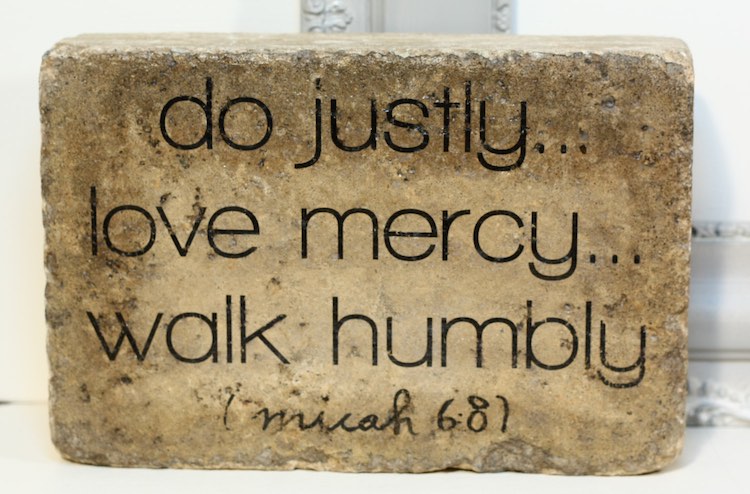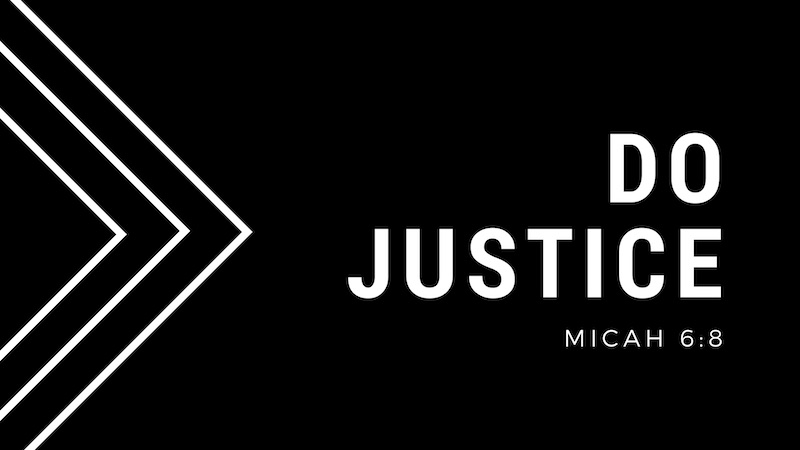As a child I remember hearing about the spiritual concept of God’s will for people but it always seemed like a foreign concept. How can a human being actually understand the will and desire of God? As I have grown older, experienced life, and have read the Bible a few times I have come to see and realize that there is a will of God for our lives if we have ears to hear and a heart to discern. What is God’s will for our lives? How can we know God’s will for our lives?
There are certain verses in the Bible that express the heart and desire of God for His creation in simple words. One of these verses is found in this week’s corresponding reading from the prophets in the book of Micah:
He has told you, O man, what is good; and what does the LORD require of you: But to do justice, to love kindness, and to walk humbly with your God? – Micah 6:8
Most of us are familiar with this passage of Scripture. This verse provides a good foundation for knowing and understanding what God requires from mankind, however, what does it mean to do justice, love kindness, and to walk humbly with God?

In this week’s Torah Portion we read about the lives and actions of two different men: one who claimed to know and live out the will of God and one who actually lived his life according to the will of God. We read about the lives of these two men in Numbers chapters twenty-two to twenty-five.
The Life Of Balaam
When the nation of Israel set up camp in front of the nation of Moab, the king of Moab feared the people of Israel and decided to hire the prophet Balaam to curse the Israelites as he saw no other way to defeat them. Balaam sought the counsel of the LORD and the LORD told him not to go with Balak’s servants, however, after the second delegation arrived Balaam pressed the issue with the LORD and the LORD permitted him to go according to Balaam’s own evil heart. Balaam went to Balak but was warned to only speak the words that God would put in his mouth (Num. 22).
The story of King Balak and the prophet Balaam is a fascinating account of a king who was willing to do and pay anything to see the downfall of the people of Israel and a prophet who was restrained by God to only bless the people of Israel. Three times Balaam requested Balak to build seven altars in order to sacrifice seven bulls and seven rams, one of each on each altar, and three times Balak had the altars built and the sacrifices offered. Forty-two animals were sacrificed to try to appease the LORD in order to let Balaam curse Israel but the LORD only permitted Balaam to bless them.
Balaam had told King Balak repeatedly that he was not free to speak anything he wanted but rather was limited to obeying the words of God:
So Balaam said to Balak, “Behold, I have come now to you! Am I able to speak anything at all? The word that God puts in my mouth, that I shall speak.” – Num. 22:38
Balaam repeated this condition of only speaking the words of the LORD several times during their journey together in Balak’s attempt to have him curse the Israelites. Balaam also claimed that he was bound to act according to the word of the LORD:
Then Balak said to Balaam, “Do not curse them at all nor bless them at all!” But Balaam replied to Balak, “Did I not tell you, ‘Whatever the LORD speaks, that I must do’?” – Num. 23:25-26
Balaam’s claim to only speak and act according to the word of the LORD must have made quite an impression on Balak and the others who were there at that time.
As great as his claims were to act and speak according to the word of the LORD, Balaam eventually showed his true colors by aiding in the destruction of the people of Israel:
While Israel remained at Shittim, the people began to play the harlot with the daughters of Moab. For they invited the people to the sacrifices of their gods, and the people ate and bowed down to their gods. So Israel joined themselves to Baal of Peor, and the LORD was angry against Israel. – Num. 25:1-3
Although Balaam was kept from cursing the people of Israel, he succeeded in helping King Balak to lead the people of Israel astray into idolatry and fornication.
We read in the New Testament, in the message to the church at Pergamum, how Balaam accomplished the downfall of Israel through giving counsel to Balak and providing a trap for the Israelites:
But I have a few things against you, because you have there some who hold the teaching of Balaam, who kept teaching Balak to put a stumbling block before the sons of Israel, to eat things sacrificed to idols and to commit acts of immorality. – Rev. 2:14
Balaam did not directly curse the Israelites but he did provide a way for the Israelites to fall into a curse through his evil counsel.
Balaam lived his life profiting from the sale of blessings and curses. He claimed to be a prophet who acted and spoke according to the words of the Living God but in reality he only acted according to his own self interests by selling the people of God to their enemy. Balaam claimed to live according to the will of God but proved himself to be a fraud.
The Life Of Pinchas
As Balaam was responsible for starting the downfall of the people of Israel in the worship of Baal Peor, Pinchas was responsible for ending it:
The LORD said to Moses, “Take all the leaders of the people and execute them in broad daylight before the LORD, so that the fierce anger of the LORD may turn away from Israel.” So Moses said to the judges of Israel, “Each of you slay his men who have joined themselves to Baal of Peor.”
Then behold, one of the sons of Israel came and brought to his relatives a Midianite woman, in the sight of Moses and in the sight of all the congregation of the sons of Israel, while they were weeping at the doorway of the tent of meeting. When Phinehas the son of Eleazar, the son of Aaron the priest, saw it, he arose from the midst of the congregation and took a spear in his hand, and he went after the man of Israel into the tent and pierced both of them through, the man of Israel and the woman, through the body. So the plague on the sons of Israel was checked. Those who died by the plague were 24,000. – Num. 25:4-9
The LORD had instructed Moses to kill the people involved in this abomination and Moses carried this out through the judges of Israel, however, the final judgment came at the hands of Phinehas the priest.
Thousands of Israelites had died because of the idolatrous acts of the people and the people were weeping before the LORD at the Tent of Meeting. It was at this time that an Israelite man brought a Midianite woman into the camp in front of all of the people. The sin of the people had already been exposed and God’s judgment brought about the slaughter of 24,000 people. When Phinehas saw the vile act of this Israelite continuing the sin of Baal of Peor, Phinehas acted swiftly and killed both of them with a spear.
The Life That God Honors
We know clearly from the biblical record that the LORD was in agreement with this act of judgment by Phinehas because the LORD rewarded him and honored him in the midst of the people:
Then the LORD spoke to Moses, saying, “Phinehas the son of Eleazar, the son of Aaron the priest, has turned away My wrath from the sons of Israel in that he was jealous with My jealousy among them, so that I did not destroy the sons of Israel in My jealousy. Therefore say, ‘Behold, I give him My covenant of peace; and it shall be for him and his descendants after him, a covenant of a perpetual priesthood, because he was jealous for his God and made atonement for the sons of Israel.’” – Num. 25:10-13
The LORD granted Phinehas His covenant of peace and an enduring priesthood through his descendants. Phinehas had acted with a godly jealously and this pleased the LORD.
The faith in God that Phinehas exhibited in the incident of Baal Peor illustrates for us the heart after God that He desires in each one of us. Phinehas acted in accordance with God’s jealousy and judgment at that time. We obviously live in a different time and situation and are not called to imitate the act of Phinehas, but rather to learn a lesson of doing justice from this man who acted in accordance with God’s will and desire.

Do Justice, Love Kindness, & Walk Humbly
In this week’s corresponding reading from the prophets we read about the attempt of Balak and Balaam to destroy Israel but more importantly we read about the desire of God for each and every one of us:
“My people, remember now what Balak king of Moab counseled and what Balaam son of Beor answered him, and from Shittim to Gilgal, so that you might know the righteous acts of the LORD.” With what shall I come to the LORD and bow myself before the God on high? Shall I come to Him with burnt offerings, with yearling calves? Does the LORD take delight in thousands of rams, in ten thousand rivers of oil? Shall I present my firstborn for my rebellious acts, the fruit of my body for the sin of my soul?
He has told you, O man, what is good; and what does the LORD require of you: But to do justice, to love kindness, and to walk humbly with your God? – Micah 6:5-8
Balaam had Balak perform at least forty-two animals sacrifices on twenty-one different altars at three different locations in order to try to persuade the LORD to agree to curse Israel. These continual sacrifices failed to achieve God’s desire.
God does not simply want sacrifices and offerings. Sacrifice and offerings without obedience to God’s will are meaningless and achieve nothing. God desires for each person to do justice, to love kindness, and to walk humbly with Him. Although we know this verse and agree with it in theory, we don’t always act according to it. I must reiterate, we are not called to imitate the act of Phinehas by executing evil doers, however, we are called to do justice, to love kindness, and to walk humbly with God.

To Do Justice
In order to do justice we must be willing at times to do the difficult task of confronting others even when it is not comfortable. The act of doing justice is probably the most difficult aspect of the three requirements of God. Although we need to be cautious in judging others and confronting sin (Matt. 7:1-5), we cannot ignore judgment in our believing communities as is confirmed in the New Testament writings of the Apostle Paul:
I wrote you in my letter not to associate with immoral people; I did not at all mean with the immoral people of this world, or with the covetous and swindlers, or with idolaters, for then you would have to go out of the world. But actually, I wrote to you not to associate with any so-called brother if he is an immoral person, or covetous, or an idolater, or a reviler, or a drunkard, or a swindler—not even to eat with such a one. For what have I to do with judging outsiders? Do you not judge those who are within the church? But those who are outside, God judges. Remove the wicked man from among yourselves. – 1 Corinthians 5:9-13
Most of us do not like to confront other people or to involve ourselves in situations that expose sin. Unfortunately, this comes easy to me. I have always been a bit more open, honest, and willing to confront others even when it is difficult. It is not that I enjoy confronting others, however, it seems to be natural for those of us with a prophetic spiritual gift. Whatever our spiritual gifting is, we must be willing to confront the sin in our communities which clearly grieves the holiness of God. I believe this is what is meant by doing justice! Phinehas illustrated this truth of “…to do justice…”
To Love Kindness & Walk Humbly With God
At the same time, the words in Micah 6:8 temper the “…to do justice…” aspect of doing God’s will with “…to love kindness, and to walk humbly with your God…” The acts of justice, loving kindness, and walking humbly with God must go hand and hand. We cannot pick and choose the one or two commands in this verse that we like best. Again I must confess that “…to love kindness…” is more difficult for me personally. I naturally judge and have to work hard to patiently listen and show lovingkindness to others. None of us have the option of picking and choosing certain aspects of God’s will. We are all called to love God with our lives through doing justice, loving kindness, and walking humbly with Him.
There is a general will of God for each of us and this general will is succinctly summarized for us in Micah 6:8. I believe God also has a more specific will for each one of us that we can know and understand through His Word and revelation by His Holy Spirit, however, to do justice, to love kindness, and to walk humbly with God is a true desire of God’s heart for each and every one of us to fulfill in our daily lives.
Shabbat Shalom!
If you enjoyed reading this article, share it today with friends! We also invite you to sign up for our weekly Torah Portion commentary on the sidebar to the right.
Help keep our weekly commentaries free and available to all. Click here to donate today:
Torah Portion: Num. 22:2 – Num. 25:9
Haftara: Micah 5:7 – Micah 6:8
Return to Torah Portion Homepage
Copyright Jewels of Judaism. All rights reserved 2019




This is a very timely message for us in America! Christians often forget to show acts of kindness and we denigrate those for whom Jesus died. Mercy triumphs over justice-it happened at the cross. I pray safe travels for you and God’s continual Blessings on you, your family, and your ministry. Shalom.
Thank you Daniel for explaining what the doing of judgement means. Loving kindness is not always easy; sometimes challenging. And to walk humbly also. God bless you and I send my blessings to your mother. Have a nice tour! Looking forward to your Torah portions later on.
To be jealous with His jealousy, justice confronting sin. Kindness, tasting everything in people through the mercy that the Lord has for us as well. So, these attitudes allow to us to walk humbly with Him, in order to obey His will. Always an inspirational reading. Shalom Daniel!